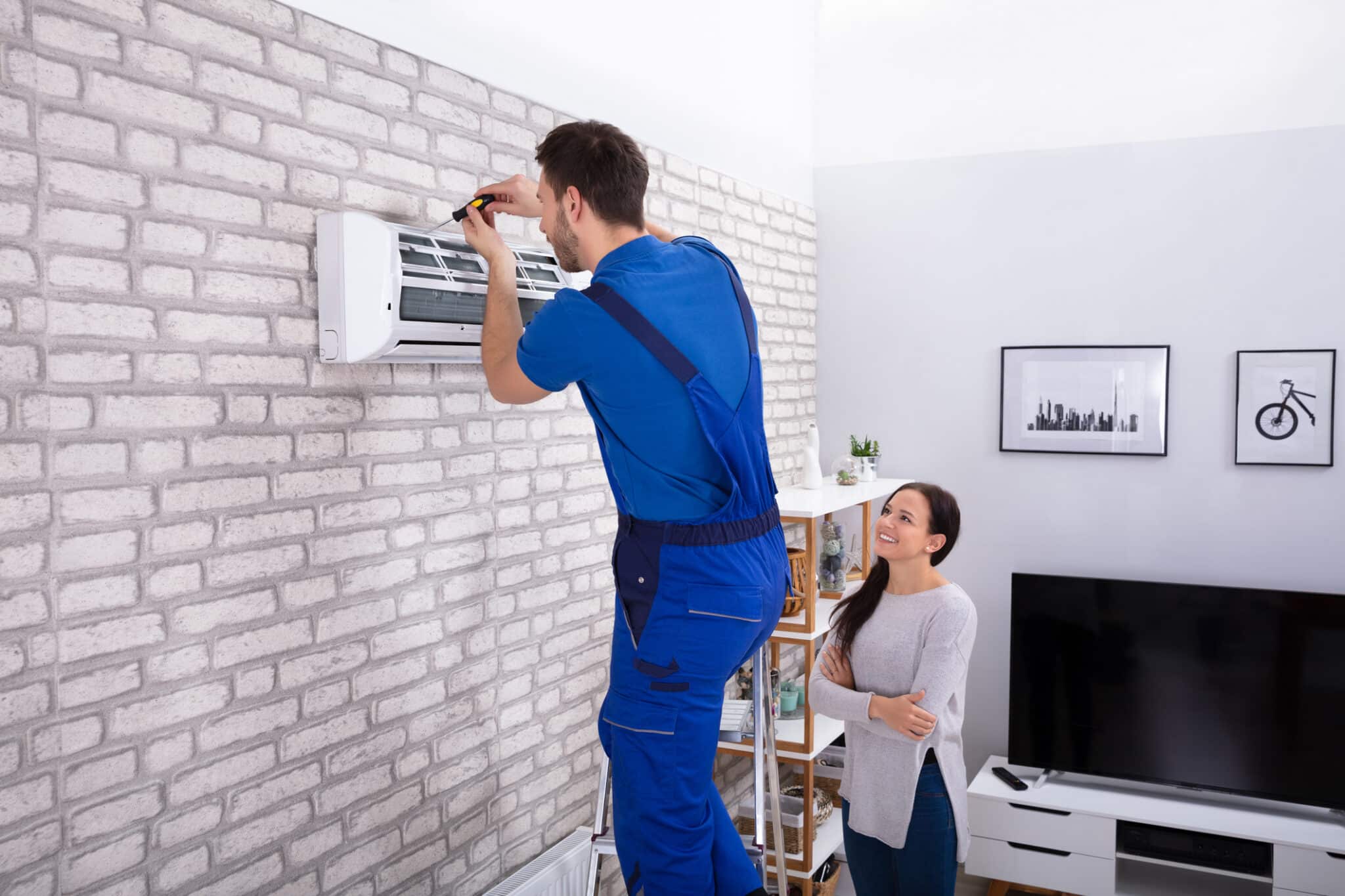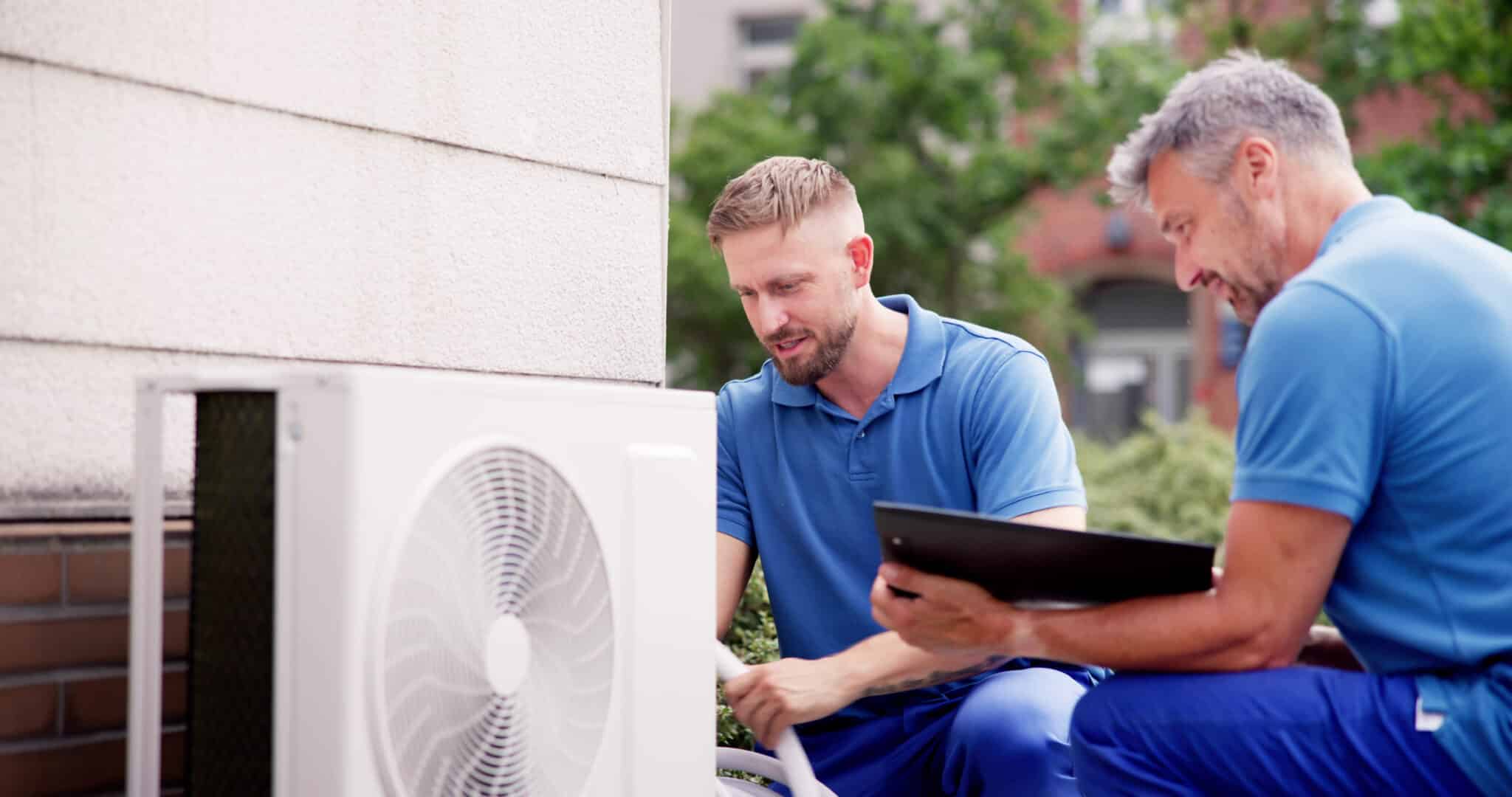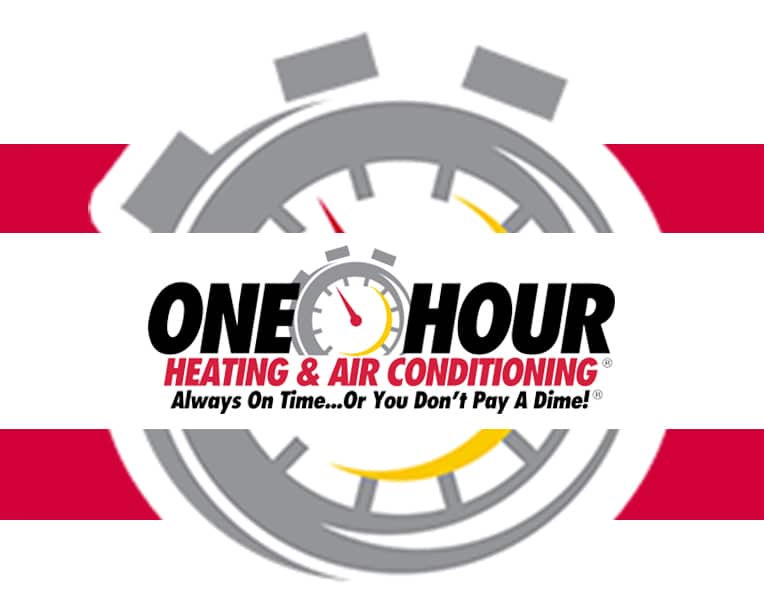HVAC Inspections – Is your HVAC system ready to handle the changing seasons? Whether it’s keeping you cool in San Diego’s hot summers or warming up chilly nights in El Cajon, your HVAC system works hard to maintain year-round comfort.
But without regular HVAC inspections, even the best systems can fall short when you need them most. These inspections are essential for improving energy efficiency, ensuring cleaner air, and keeping your HVAC system running smoothly when it matters most.
What Are HVAC Inspections?
An HVAC inspection is a detailed evaluation of your heating, ventilation, and air conditioning system to ensure every component functions correctly.
During HVAC inspections, a professional examines everything from filters and ducts to the thermostat and electrical parts to verify safe and efficient operation.
These inspections help catch minor issues, like clogged filters, that could lead to bigger, costly problems if ignored. Regular HVAC inspections ultimately keep your system efficient, lower energy bills, and reduce the risk of expensive repairs.
Key Benefits of Regular HVAC Inspections
Regular HVAC inspections offer a variety of benefits that go beyond simple maintenance. By investing in routine check-ups, homeowners can enjoy improved energy efficiency, a longer-lasting system, cleaner indoor air, fewer emergency repairs, and a safer home environment.
Improved Energy Efficiency
Routine HVAC inspections keep your system running at peak efficiency, which directly reduces energy consumption. When an HVAC system is well-maintained, it doesn’t have to work as hard to heat or cool your home, resulting in lower energy bills.
During inspections, professionals clean and adjust components, removing dust and debris that can interfere with airflow and efficiency.
Efficient systems provide consistent temperatures without wasting energy, making a noticeable impact on monthly utility bills. A more energy-efficient system not only saves money but also reduces your home’s environmental footprint.
Extended Lifespan of HVAC System
Regular inspections can significantly extend the lifespan of your HVAC system by preventing wear and tear. Small issues, like worn-out parts or dirt buildup, are addressed early on, which helps avoid the damage that leads to major repairs or even system failure.
A well-maintained system operates with less strain, meaning it lasts longer and performs more reliably over the years. Investing in routine check-ups is much more affordable than replacing an entire system prematurely. Regular care ensures that your HVAC investment serves you well for as long as possible.
Better Indoor Air Quality
Inspections help maintain better indoor air quality by reducing dust, allergens, and pollutants that accumulate in HVAC systems. When filters and ducts are clogged, the system can spread contaminants throughout your home, affecting the air you breathe.
HVAC professionals clean these components during inspections, which improves airflow and keeps the air fresh and healthy. Good indoor air quality is essential for family members with allergies or respiratory issues. A clean HVAC system supports a healthier living environment by limiting exposure to airborne particles.
Reduced Need for Emergency Repairs
Routine HVAC inspections reduce the likelihood of unexpected, costly breakdowns that often require urgent repairs. Inspections allow professionals to identify and fix small issues before they escalate, which keeps the system reliable and reduces stress.
By preventing sudden failures, especially during extreme weather, you avoid the inconvenience and cost of emergency services.
This proactive approach means your system is less likely to stop working when you need it most. Fewer breakdowns also mean less disruption to your daily life and more confidence in your HVAC system’s performance.
Ensuring Safety in Your Home
Safety is a critical reason for regular HVAC inspections, as malfunctioning systems can pose risks like gas leaks or electrical issues. During an inspection, professionals check for potential hazards, such as faulty wiring or gas connections, which could lead to dangerous situations.
They also ensure that ventilation is functioning correctly, which is essential for maintaining safe indoor air quality. Regular inspections help reduce fire risks and the chances of carbon monoxide leaks, keeping your family safe and giving you peace of mind. A well-maintained HVAC system supports a secure, worry-free home environment.

What Happens During HVAC Inspections?
During HVAC inspections, a technician thoroughly checks each part of the system to ensure everything is in top condition. This process includes examining and cleaning essential components, testing the system’s overall performance, and making necessary adjustments to improve efficiency.
Checking and Replacing Filters
One of the first steps in an HVAC inspection is checking the system’s filters for dust and dirt buildup. Dirty filters restrict airflow, making the system work harder, which can lead to higher energy costs and unnecessary wear. If the filters are clogged, the technician will replace them with new ones, allowing air to flow smoothly and reducing strain on the system.
Clean filters also contribute to better indoor air quality, as they prevent dust and allergens from circulating in your home. Regular filter changes are an easy yet effective way to keep the HVAC system running efficiently.
Inspecting and Cleaning Ducts
The technician will inspect the ducts to ensure they’re clean and free from obstructions that could hinder airflow. Dust, dirt, and even mold can build up in the ductwork, affecting air quality and causing your system to lose efficiency.
Cleaning the ducts improves the system’s performance and helps prevent contaminants from spreading through your home. During this step, the technician also checks for any leaks or damage that could lead to energy loss. Well-maintained ducts are essential for keeping your HVAC system effective and your indoor air clean.
Examining Thermostat Functionality
Next, the technician will test the thermostat to ensure it’s accurately reading and maintaining the temperature you set. A poorly calibrated thermostat can lead to inconsistent temperatures and make the system work harder than necessary.
If there are issues with the thermostat, the technician may recalibrate it or recommend a replacement, especially if it’s an older model.
An accurate thermostat helps the system run efficiently, providing reliable comfort throughout your home. Keeping the thermostat in top shape ensures you’re getting the best performance from your HVAC system.
Inspecting Electrical Components
During an inspection, all electrical components, including wiring, connections, and controls, are examined to ensure they’re working safely and efficiently. Loose or faulty wiring can lead to malfunctions or even pose safety hazards like fires.
The technician will tighten connections, check for signs of wear, and replace any damaged parts. Properly functioning electrical components are essential for a safe, reliable HVAC system. This step is crucial for avoiding electrical issues that could interrupt service or create a hazardous situation in your home.
Testing System Performance
Finally, the technician will run and test the HVAC system to evaluate its overall performance, ensuring that it heats or cools efficiently and meets your home’s needs. They’ll listen for unusual sounds, check airflow, and measure system output to confirm it’s running at peak efficiency.
Any abnormalities noticed during this testing can lead to targeted repairs or adjustments to keep the system in optimal condition. Testing system performance is the final step in confirming that your HVAC system is ready to handle whatever the season brings.
The Costs of Skipping Regular HVAC Inspections
Skipping regular HVAC inspections might seem like a way to save time and money, but it often leads to more expensive issues over time.
Without routine maintenance, your system becomes less efficient, costing you more in energy bills and increasing the risk of major repairs. Beyond financial impact, a neglected HVAC system can also compromise indoor air quality and your family’s health.
Higher Energy Bills
When an HVAC system isn’t properly maintained, it has to work harder to keep your home at a comfortable temperature. Dust, worn parts, or poor airflow can make the system struggle, using more energy to do the same job.
This extra effort directly increases your monthly energy bills, as the system requires more power to function. Over time, this can add up to significant costs that could have been prevented with a simple inspection. Regular maintenance keeps your system efficient, helping you save on energy expenses.
Increased Risk of Major Repairs
Neglecting inspections can lead to small problems going unnoticed until they become much larger, more costly repairs. Minor issues like a worn-out part or a clogged filter might seem harmless, but if ignored, they can lead to major breakdowns or even full system failure.
Emergency repairs tend to be expensive, and unexpected breakdowns can cause discomfort, especially during extreme weather. Regular inspections catch these small issues early, reducing the risk of sudden, high-cost repairs that could disrupt your daily life.
Reduced System Lifespan
Skipping inspections shortens the overall lifespan of your HVAC system. When small problems aren’t addressed, they cause wear and tear that accumulates over time, making the system wear out faster. Routine check-ups keep all components working smoothly, so the system lasts longer and remains reliable.
Replacing an HVAC system is a major expense, so extending its life with regular maintenance is a smart, cost-effective choice. Investing in inspections helps you get the most out of your HVAC system, delaying the need for a costly replacement.
Poor Air Quality and Health Risks
Neglected HVAC systems can lead to poor indoor air quality, allowing dust, mold, and allergens to circulate throughout your home. Clogged filters and dirty ducts can worsen allergies and respiratory conditions, impacting your family’s health.
Over time, breathing in these pollutants can lead to more serious health issues, particularly for those with asthma or allergies.
Regular inspections include cleaning and filter changes, which help maintain a cleaner, healthier indoor environment. Prioritizing air quality with routine maintenance ensures your home remains a safe, comfortable space for everyone.
When to Schedule HVAC Inspections
Timing matters when it comes to HVAC inspections. Scheduling regular check-ups not only keeps your system efficient but also helps prevent issues before they affect your comfort. Experts recommend at least one inspection per year, but certain times and situations make it even more important to check in on your system.
Seasonal Changes
Scheduling HVAC inspections before the start of each major season—typically in spring and fall—ensures that your system is prepared for peak usage. In spring, an inspection can get your air conditioning ready for the warmer months, while a fall inspection prepares your heating system for cooler weather.
These seasonal inspections give your HVAC technician a chance to perform necessary tune-ups, clean components, and make minor adjustments.
This routine helps prevent breakdowns when you need your system the most, providing peace of mind as the weather changes. Planning inspections around the seasons keeps your system running efficiently all year.
After Major Weather Events
Severe weather, like heat waves or cold snaps, can put extra strain on your HVAC system, especially if you live in areas with extreme seasonal temperatures. After a major weather event, it’s a good idea to schedule an inspection to check for any damage or stress on the system.
High temperatures can overwork an AC unit, while freezing weather can impact heating components. An inspection after these events allows a technician to spot and address potential issues caused by weather-related strain. This proactive approach helps prevent long-term damage and ensures that your system is ready for whatever comes next.
Choosing the Right HVAC Professional
Choosing a reliable professional for HVAC inspections is essential for keeping your system in top condition and ensuring that each inspection is thorough and effective. The right technician will bring both expertise and care, giving you confidence that your system is in capable hands.
Look for Experienced Professionals
Experience is key when it comes to HVAC inspections, as seasoned professionals know what to look for and can quickly identify potential problems. Technicians with years of hands-on experience have likely seen a variety of systems and are familiar with common issues that can arise in both old and new equipment.
Choosing an experienced professional means you’re getting someone who knows the ins and outs of HVAC systems and can handle unexpected issues on the spot. Asking about a technician’s experience with HVAC inspections will help you feel confident in the care your system receives.
Check Reviews and Ask for Referrals
Before booking an HVAC inspection, take the time to read reviews and, if possible, get referrals from friends or neighbors who have used local HVAC services. Positive reviews from past clients can be a great indicator of a technician’s reliability, professionalism, and quality of work.
Referrals from people you trust provide additional peace of mind, as you know the person you’re hiring has done quality work for others in your area. Checking reviews and asking for referrals is a quick way to ensure you’re choosing a dependable HVAC professional who will handle your system with care.
Ask About Maintenance Plans
Many HVAC professionals offer maintenance plans that include regular HVAC inspections and discounts on repairs or parts. A maintenance plan ensures that your system is inspected on a consistent schedule, helping you avoid the risk of forgotten appointments or last-minute inspections.
These plans often cover seasonal tune-ups, priority scheduling, and reminders when it’s time for the next inspection. Maintenance plans can save you money in the long run by keeping your system running efficiently and reducing the likelihood of emergency repairs. Asking about these plans is a smart move if you’re committed to regular HVAC upkeep.
Ready to Keep Your HVAC Running Smoothly Year-Round?
Don’t let unexpected HVAC issues disrupt your comfort! Trust One Hour Heating & Air Conditioning San Diego to provide reliable HVAC inspections that keep your system in peak condition.
Serving the San Diego, El Cajon, and Lakeside, CA areas, our experienced team ensures your home stays efficient, safe, and comfortable every season. Schedule your inspection today and experience the difference professional care can make!

FAQs About HVAC Inspections
How long does an HVAC inspection take?
A typical HVAC inspection usually takes about an hour, though the time can vary depending on the system’s size and condition. If issues are found, repairs may extend the duration, but most inspections are quick and straightforward.
Can I do any HVAC maintenance on my own?
Yes, homeowners can handle simple maintenance tasks like changing filters every few months and keeping vents clear of dust. However, more complex tasks, such as checking electrical components, should be left to professionals during your regular HVAC inspections.
What’s the best time of year for an HVAC inspection?
Spring and fall are ideal times for HVAC inspections because your system can be tuned up before the demands of summer or winter. Seasonal inspections help your HVAC system handle peak performance when temperatures fluctuate the most.
What can I expect during an HVAC inspection?
During an HVAC inspection, a technician will examine filters, ducts, electrical components, and the thermostat, checking for any signs of wear, buildup, or damage. This process helps ensure that your system runs efficiently and safely, providing you with dependable performance year-round.
Are HVAC inspections really necessary if my system seems to be working fine?
Yes, regular HVAC inspections are essential even if your system appears to be functioning well. Inspections help catch minor issues before they turn into major problems, improving energy efficiency and extending the lifespan of your system.
























